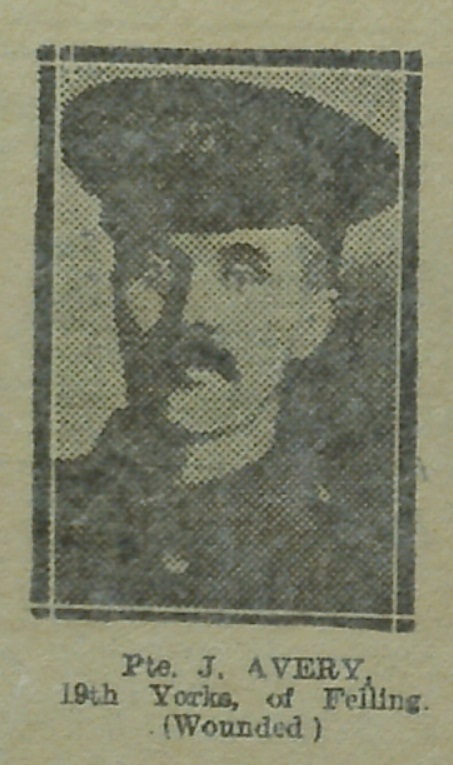
John Avery was a miner and lived at Felling on Tyne, Co. Durham. He was married to Elizabeth Anne Speight. He was 29 years old when he enlisted at the outbreak of war and was initially posted to the 10th Battalion but subsequently served in the 11th and 8th.
John suffered a gunshot wound to two fingers on his right hand in September 1915 and subsequently from the effects of gassing and shell shock. He was posted to the reserves in early 1917 and sent to work at Heworth Colliery, Felling on Tyne. Due to his wounds he was unable to work full weeks and he applied for a disability pension. He was granted 12 shillings and 6 pence a week to rise to 13/9d and subject to review after 48 weeks.
He was awarded the 14/15 Star, the British War Medal , the Victory Medal and a Silver War Badge.
Explore more memories from the ribbon
-
Austin Graham
Submitted by Pat Burgess. The Graham family were local to Barnard Castle, they lived on The Bank, where father John had a chemist and grocery business. John Austin was born on 2 March 1872. After his time at school from 1886 until 1889, he took a Electrical Engineering apprenticeship. Later he started an electrical business with his brother – Graham Brothers Electrical Engineers in Middlesbrough. He was secretary of the Saltburn R.N.L.I. and a gifted operatic singer. Serving as a territorial captain, Austin Graham was with the 4th battalion when war broke out in August of 1914. He landed with the battalion at Boulogne on April 18th 1915 when the battalion was almost straight away thrown into the 2nd battle of Ypres. On April 24th Captain Graham and his men had their first taste of action in fierce fighting during the Battle of St Julien. On Whit Monday 1915 the battalion were in trenches astride the Menin Road at Hooge and Austin Graham was badly gassed and hospitalised with his injuries. In early 1918 the battalion were back in the Ypres sector and when the German Spring Offensive opened on March 21st they were in a position close to Hancourt. There followed nine days of fighting on the retreat under the enemy onslaught. A brief rest at Bethune followed this and then on April 8th the battalion was moved up to take part in the Battle of the Lys. By now CO of the 4th battalion Major Austin Graham was…
-
Bill Moore
At over six feet tall and 22 stone, Bill Moore must have been an impressive sight! While originally from Wells, he made his way to the north of England with his travelling boxing booth. For a time he set up at Darlington, but at the outbreak of war in 1914, Moore decided to move his show to Catterick Camp. The ‘Tommies’ must have enjoyed what he had to offer. Boxing matches even involved Annie, his daughter and a captive bear which on one occasion escaped onto local moorland. Military Police eventually tracked the animal down, much to the relief of the locals.
-
John B Lishman
John Benson Lishman was nearly 47 when he was called up to join the London Electrical Engineers in February 1918 as a Pioneer. While his War Service was relatively brief and uneventful it was the work he did before enlisting that proved to be his enduring legacy. On April 10th 1915, Lishman set up the first meeting of the 8th Darlington Scout Group with 12 members. It was his idea to provide activities for young people while their fathers were away fighting. The first thing the boys did was set up a Drum & Fife band and played concerts in aid of the Red Cross. Some of examples of the 8th’s packed programme include camping, hiking, badge work and collecting materials for the war effort, most of which they still do today. It was a sad day when the Troop learned that their Scout Master was leaving them, as this excerpt from their Log Book tells: “The lads had collected a small pocket wallet & the Secretary presented it as a small – a very small token of love & respect for the work & time spent on us by the S.M.” Lishman returned to the Group in 1919 and after a “solemn handshake” it was back to normal. Submitted by the grateful Leaders and Members of the 8th Darlington Scout Group.
